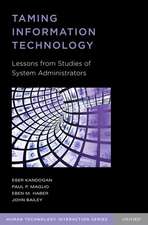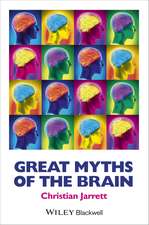White Bears and Other Unwanted Thoughts: Suppression, Obsession, and the Psychology of Mental Control
Autor Daniel M. Wegneren Limba Engleză Paperback – 24 mai 1994
In a series of groundbreaking experiments, Daniel M. Wegner told subjects not to think about white bears. Of course, they found it impossible to avoid thinking of the bears--just as it often seems impossible to stop thinking about forbidden foods, a painful memory, or everyday fears and worries. Synthesizing a wealth of scientific knowledge in an accessible, engaging style, this book reveals that the more we attempt to push away or avoid unwanted thoughts, the deeper they take hold. Wegner offers compelling insights into how unpleasant or obsessive thoughts get out of control--and what we can do to break free of them. Written for general readers, the book has been widely used in undergraduate- and graduate-level courses.
Preț: 123.27 lei
Nou
Puncte Express: 185
Preț estimativ în valută:
23.60€ • 25.64$ • 19.83£
23.60€ • 25.64$ • 19.83£
Carte disponibilă
Livrare economică 31 martie-14 aprilie
Livrare express 15-21 martie pentru 19.96 lei
Preluare comenzi: 021 569.72.76
Specificații
ISBN-13: 9780898622232
ISBN-10: 0898622239
Pagini: 207
Dimensiuni: 138 x 216 x 18 mm
Greutate: 0.26 kg
Ediția:Reprint
Editura: Guilford Publications
Colecția Guilford Press
ISBN-10: 0898622239
Pagini: 207
Dimensiuni: 138 x 216 x 18 mm
Greutate: 0.26 kg
Ediția:Reprint
Editura: Guilford Publications
Colecția Guilford Press
Public țintă
Postgraduate, Professional, Professional Practice & Development, and UndergraduateCuprins
Preface (1994)
Preface
1. Mental Control
2. Wellsprings of Suppression
3. The Mental Apparatus
4. Self-Distraction
5. The Remote Control of Thinking
6. The Will to Disbelieve
7. Mood Control
8. Exciting Thoughts
9. Synthetic Obsession
Notes
Index
Preface
1. Mental Control
2. Wellsprings of Suppression
3. The Mental Apparatus
4. Self-Distraction
5. The Remote Control of Thinking
6. The Will to Disbelieve
7. Mood Control
8. Exciting Thoughts
9. Synthetic Obsession
Notes
Index
Notă biografică
Daniel M. Wegner, PhD, until his death in 2013, was the John Lindsley Professor of Psychology in Memory of William James at Harvard University. Prior to joining the Harvard faculty in 2000, Dr. Wegner was the William R. Kenan Jr. Professor of Psychology at the University of Virginia. His research was funded by the National Science Foundation and by the National Institute of Mental Health. A 1996-1997 Fellow of the Center for Advanced Study in the Behavioral Sciences, Dr. Wegner was also a Fellow of the American Association for the Advancement of Science and of the American Academy of Arts and Sciences. He was a recipient of the William James Fellow Award from the Association for Psychological Science, the Distinguished Scientific Contribution Award from the American Psychological Association, the Distinguished Scientist Award from the Society of Experimental Social Psychology, and the Donald T. Campbell Award from the Society for Personality and Social Psychology.
Recenzii
"Insightful, provocative, and firmly grounded in research....I will be using it in my seminar on personality." --Elissa Wurf, Lehigh University
"Pioneering explorations of mental control. A major contribution to the field and a stimulating read." --David M. Clark, DPhil, Department of Experimental Psychology, University of Oxford
"Over 1000 Introduction to Psychology students have read the book and raved about it. It shows them how psychologists come up with ideas and how they go about testing these ideas through rigorous scientific research. Students also loved the writing style and found it highly engaging and accessible. However, the book should not be considered light reading. I have also used it in two graduate seminars and the students have consistently had high praise for how Wegner weaves together diverse psychological theories to arrive at an important understanding of mental control and the self-regulation of emotion." --Todd Heatherton, Ph.D., Harvard University
"For Dan Wegner, asking people to avoid thoughts of a white bear is more than a clever demonstration. It is one of the tasks he has used for some years now in a creative set of laboratory experiments on the consequences on the deliberate thought suppression. These consequences are something of a paradox: the more one tries not to think a particular thought, the more that thought invades conscious awareness...White Bears and Other Unwanted Thoughts is a clever, engaging, and highly readable book that explores how individuals try to influence the contents of their own consciousness and the reasons for the success and failure of these attempts." --Peter Salovey and Paula M. Niedenthal in Imagination, Cognition and Personality
"Wegner's White Bears is a masterful introduction to the thorny issues of consciousness and self-control. No student can read this book without several times thinking: 'Aha, that's why I do that.'…Students need more academic thrillers like White Bears."--Matthew D. Lieberman, PhD, Department of Psychology, University of California, Los Angeles
"Everyone has at one time or another had a thought that she or he just didn't want in mind--and knows the difficulty of suppressing that thought....[Wegner's] advice, however unsettling, is to let your personal white bears out, since that appears to be the only way to finally set them free."--American Health
-"Pioneering explorations of mental control. A major contribution to the field and a stimulating read." --David M. Clark, DPhil, Department of Experimental Psychology, University of Oxford
"Over 1000 Introduction to Psychology students have read the book and raved about it. It shows them how psychologists come up with ideas and how they go about testing these ideas through rigorous scientific research. Students also loved the writing style and found it highly engaging and accessible. However, the book should not be considered light reading. I have also used it in two graduate seminars and the students have consistently had high praise for how Wegner weaves together diverse psychological theories to arrive at an important understanding of mental control and the self-regulation of emotion." --Todd Heatherton, Ph.D., Harvard University
"For Dan Wegner, asking people to avoid thoughts of a white bear is more than a clever demonstration. It is one of the tasks he has used for some years now in a creative set of laboratory experiments on the consequences on the deliberate thought suppression. These consequences are something of a paradox: the more one tries not to think a particular thought, the more that thought invades conscious awareness...White Bears and Other Unwanted Thoughts is a clever, engaging, and highly readable book that explores how individuals try to influence the contents of their own consciousness and the reasons for the success and failure of these attempts." --Peter Salovey and Paula M. Niedenthal in Imagination, Cognition and Personality
"Wegner's White Bears is a masterful introduction to the thorny issues of consciousness and self-control. No student can read this book without several times thinking: 'Aha, that's why I do that.'…Students need more academic thrillers like White Bears."--Matthew D. Lieberman, PhD, Department of Psychology, University of California, Los Angeles
"Everyone has at one time or another had a thought that she or he just didn't want in mind--and knows the difficulty of suppressing that thought....[Wegner's] advice, however unsettling, is to let your personal white bears out, since that appears to be the only way to finally set them free."--American Health
This rewarding and informal essay takes a fresh, unconventional look at the ways we deal with unwanted thoughts and relates those mental processes to mood swings, addiction, and day-to-day survival.
--Publishers Weekly, 5/3/1994ƒƒAn appealing, thought-provoking study that unpacks parts of mental life that are usually taken for granted....If you read this book, you may find yourself thinking about things you never thought before.
--Los Angeles Times, 5/3/1994ƒƒWegner presents his subject intriguingly, with a sense of humor that may frequently have the reader laughing out loud. A `must read' for anyone who has tried to no avail to avoid a recurring worry, fear, or thought of any kind.
--Booklist, 5/3/1994Descriere
In a series of groundbreaking experiments, Daniel M. Wegner told subjects not to think about white bears. Of course, they found it impossible to avoid thinking of the bears--just as it often seems impossible to stop thinking about forbidden foods, a painful memory, or everyday fears and worries. Synthesizing a wealth of scientific knowledge in an accessible, engaging style, this book reveals that the more we attempt to push away or avoid unwanted thoughts, the deeper they take hold. Wegner offers compelling insights into how unpleasant or obsessive thoughts get out of control--and what we can do to break free of them. Written for general readers, the book has been widely used in undergraduate- and graduate-level courses.













